By Edmond Lam, Assistant Director, and Cecilia Smith, Administrative Assistant, ACS Green Chemistry Institute
Meet the winners of the 2024 Sustainable Futures Initiative Grant Program! With research interests spanning from PFAS substitutes to degradable polyesters to green steel technology, these grantees are leading the charge in developing transformative chemistries that address U.N. Sustainable Development Goals and are passionate about instilling the importance of green and sustainable chemistry in their students.
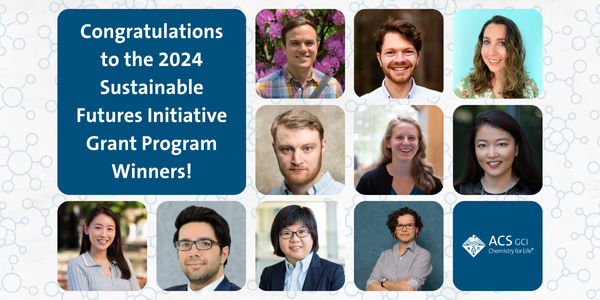
“Green chemistry is both a challenging and deeply rewarding field. It is not only a responsible and essential area of study but also incredibly exciting. The principles of green chemistry force a chemist to think outside the box, collaborate across disciplines, and adopt a holistic approach to problem-solving,” says 2024 Early Career Postdoctoral (ECP) Faculty Bridge Grant awardee Michael McGraw when describing the importance of green chemistry and sustainability in his research direction and methodology. McGraw is one of seven early career faculty members and postdoctoral fellows to receive a 2024 ECP Grant from the ACS Campaign for a Sustainable Future.
The ACS Campaign for a Sustainable Future aims to advance chemistry innovations to address the challenges articulated in the U.N. Sustainable Development Goals. Launched in 2022, this multifaceted initiative aims to create a lasting impact on how we conduct research, how we teach chemistry, and how we collaborate globally. One of the key initiatives of the Campaign is the Sustainable Futures Initiative Grant Program (SFIGP), which provides catalytic funding for early and mid-career faculty interested in developing a research and teaching portfolio that contributes directly to developing transformative chemistries that address U.N. Sustainable Development Goals.
The ECP Grant, one of two grants supported by the SFIGP, focuses on the first few years of chemistry and engineering faculty members’ careers—often the most challenging and critical years for developing a robust research program that attracts grant funding, provides holistic training and mentorship to graduate students and postdoctoral fellows, and contributes to the culture of the department and the professional community. To that end, the seven recipients of the ECP Grant will receive support for a postdoctoral fellow’s salary, benefits, and travel for two years, allowing the grant recipients to launch a productive research group as a new faculty member.
The ACS Principal Investigator Development in Sustainability (PISD) Grant focuses on interdisciplinary collaboration and training for early- or mid-career researchers, providing funding to recipients who will benefit from a 6–12 month sabbatical at a hosting institution that they have intentionally selected to acquire new knowledge to advance their green and sustainable chemistry research. The program intends to foster connections between academia and industry, national laboratories, or other institutions that can provide interdisciplinary research opportunities.
Awardees for both grants were selected based on the innovative qualities of their research, its alignment with sustainability and the U.N. Sustainable Development Goals, and its uniqueness. A feature of these grants is that they not only help promote new sustainability research, but also build capacity in green chemistry education, which has historically been a major barrier to the widespread adoption of green chemistry practices. ECP and PISD awardees will participate in a Green Chemistry Education Workshop at ACS Fall 2025 in Washington, D.C. to network with fellow awardees and learn best practices in green chemistry education from the 2025 Green Chemistry Instructor Award Winners.
Join us in congratulating the winners—and read on to discover the enthusiasm with which the grantees will bring green chemistry and engineering to their students!
2024 ECP Grant Winners
Read more about the ECP winners’ research projects.
Kelvin H. Bates, Assistant Professor at CU Boulder
Project Title: Testing and Design of Atmospherically Benign Substitutes for Perfluoroalkyl Substances
“My research has always been driven by questions of sustainability: how can a better understanding of the chemical processes that lead to ozone and aerosol pollution help us to better forecast air quality and better conceive pollution mitigation strategies?”
Jesse Gordon – Postdoctoral Fellow at Harvard University 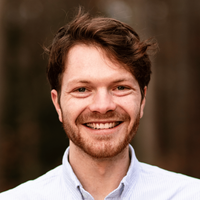
Project Title: Sustainable Strategies for Radical Amination Catalysis
“Equally important to my research vision is the role of sustainability in my teaching. The growing global emphasis on sustainability underscores the need to weave its principles into the chemistry curriculum. I hope to inspire students to see themselves as agents of change who can address global challenges through chemistry.”
Heather O. LeClerc – Postdoctoral Fellow at Yale University 
Project Title: Enabling a Renewable Carbon-Based Economy by Unraveling Complex Organic Mixtures
“My passion for sustainability began before I had even learned about green chemistry. On a family vacation to the Bahamas in middle school, I remember telling my mom that one day I would reduce their reliance on diesel for electricity and transportation. As I have continued to learn about the principles of green chemistry and delve into sustainability-focused research, I strongly believe that all chemistry (and chemical engineering) should be green!”
Michael Lawrence McGraw – Assistant Professor at University of Arkansas 
Project Title: A Sustainable Polyaddition Platform for Degradable Polyesters
“Green chemistry is both a challenging and deeply rewarding field. It is not only a responsible and essential area of study but also incredibly exciting. The principles of green chemistry force a chemist to think outside the box, collaborate across disciplines, and adopt a holistic approach to problem-solving.”
Lauren Nicole Pincus – Assistant Professor at George Washington University 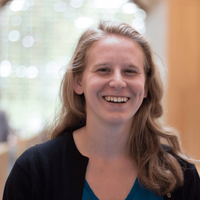
Project Title: Fueling a circular economy: selective recovery of endangered elements from photovoltaic waste using ion-imprinted biopolymers
“Central to my teaching philosophy is the goal of my students viewing green chemistry as an intrinsic component of chemistry.”
Duhan Zhang – Postdoctoral Associate at Massachusetts Institute of Technology 
Project Title: Transforming Tailings and Low-grade Ores into Green Steel and Rare Earth Concentrates: Achieving Zero Carbon Emissions and Waste
“By emphasizing the intersection of sustainability and engineering, I aim to prepare future scientists and engineers to lead the energy and sustainability transition toward a greener world.”
Xiaohui Xu – Assistant Professor at Rowan University 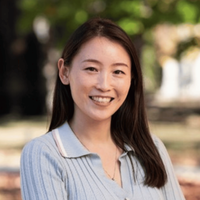
Project Title: Integrated Lithium Extraction and Water Recovery
“As an educator, I am dedicated to instilling a sense of responsibility regarding sustainable practices in both teaching and research. My goal is to inspire future scientists to integrate sustainability into their research and careers.”
2024 PISD Grant Winners
Read more about the PISD winners’ research projects.
Milad Abolhasani – ALCOA Professor & University Faculty Scholar at North Carolina State University 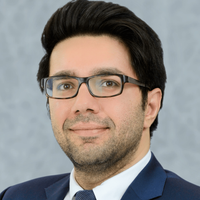
Project Title: A Sustainable Research Acceleration Framework for CO2 Photoreduction Using Self-Driving Labs
Sabbatical Host: ETH Zurich
“I plan to push the boundaries of sustainable self-driving labs, using advanced flow chemistry and machine learning to address global energy and environmental challenges.”
Grace Wan-Ting Chen – Associate Professor at the University of Massachusetts Lowell 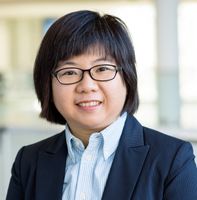
Project Title: Bio-Inspired Optimization for Microbial-Assisted Plastic Recycling and Pollution Mitigation in Aquatic Ecosystems (BIO-MAP)
Sabbatical Host: Woods Hole Oceanography Institution
“I plan to develop a graduate-level course on "Sustainable Green Chemistry in Polymer Science and Plastics Engineering,” which will empower students to design eco-friendly materials, promoting sustainability in polymer science and engineering for long-term impact.”
Carla Ng – Associate Professor at the University of Pittsburgh 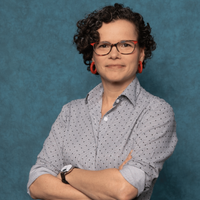
Project Title: Unlocking Safer Alternatives: Top-Down and Bottom-Up Thermodynamics for More Sustainable Molecular Design
Sabbatical Host: University of Toronto
“Only through applying the principles of green chemistry and safe and sustainable by design can society continue to enjoy the benefits of chemistry and technology without the unintended consequences of hazardous chemicals.”
